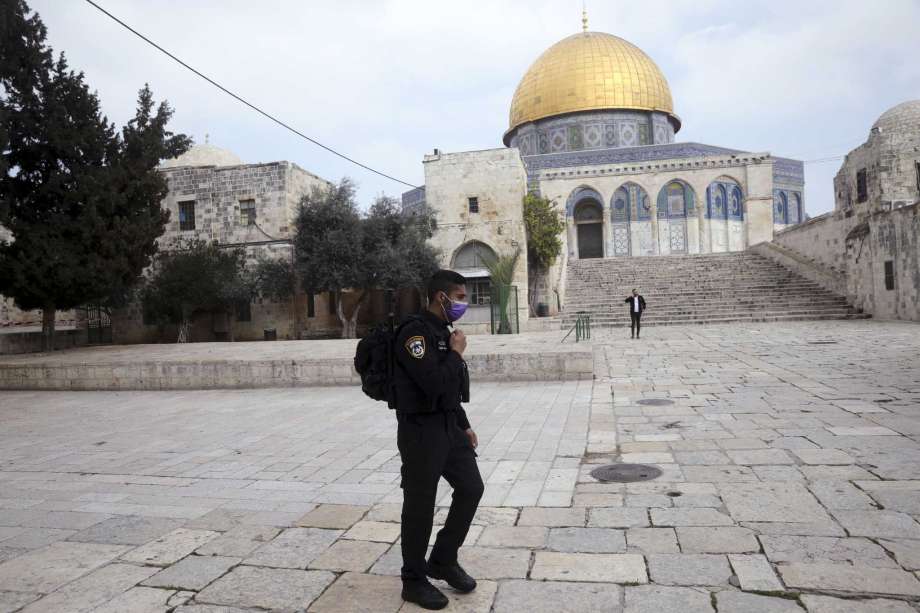
TEHRAN/JERUSALEM: Iran shut a key Shiite tomb and appealed yesterday to its citizens to stay at home to halt a coronavirus outbreak it said has claimed over 700 lives and infected nearly 14,000 people. The new overall tolls announced by the health ministry included another 113 deaths and 1,209 new confirmed cases of COVID-19 infection. People "should cancel all travel and stay at home so that we may see the situation improving in the coming days," ministry spokesman Kianoush Jahanpour said.
In line with measures to stop the virus, the tomb of Imam Reza in Iran's holy Shiite city of Mashhad was closed to pilgrims until further notice. "Currently, the porches of the mausoleum and generally all the covered spaces of the holy shrine are closed," a spokesman for the shrine told AFP. All collective prayers had also been cancelled "except in open spaces and courtyards" of the shrine, he added.
Jahanpour said the total number of confirmed cases of COVID-19 infection across Iran was now 13,938. Tehran province had the highest number of new infections with 251 fresh cases. But Khorasan Razavi province, home to the holy city of Mashhad, followed with new 143 cases to a total of 568. "Cases there will probably increase," the official said, calling on everyone to refrain from travelling to the northeastern province.
The outbreak in Iran is one of the deadliest outside of China, where the disease originated. Jahanpour called on Iranians to "take the coronavirus seriously" and especially be mindful of elderly relatives who are most vulnerable to the infection. Despite such warnings people were still seen crowding public areas on state television. Between feel-good programming of bloopers and comedy, it showed a bank manager at a busy branch calling on people to do their transactions online.
Iran said on Friday that security forces would clear streets nationwide within 24 hours so all citizens can be checked for coronavirus. But Iranian media gave no indication of the operation taking place yesterday and officials made no mention of the measure. Members of the Basij, a volunteer militia loyal to Iran's establishment, were involved in helping people by handing out sanitary items on Tehran's streets. Several politicians and officials, both sitting and former, have been infected with the virus, and some have died from the illness.
The latest suspected case was Ayatollah Hashem Bahtayi Golpayegani, a member of the Assembly of Experts, which is tasked with appointing and monitoring Iran's supreme leader. President Hassan Rouhani denied lockdowns had been imposed on entire areas, and said provincial officials were not allowed to decide on the issue. "Neither today, nor during Nowrouz and before or after it, we have no quarantine and all businesses are free and government services will continue," Rouhani said at a televised news conference with business-owners.
"Provinces are under no circumstances allowed to decide regarding closures," he added, noting all decisions would be made by the Tehran-based headquarters tasked with fighting coronavirus. Rouhani announced a set of measures designed to ease pressure on businesses, including later deadlines for the payment of taxes, loans and bills. Cash handouts of up to six million rials ($38) would go to three million impoverished households whose main breadwinners are "peddlers" or in temporary jobs. Another four million households would receive low-interest loans from between 10-20 million rials ($63-$127) with the government subsidizing part of their payment.
Jerusalem's Al-Aqsa Mosque and Dome of the Rock will shut their doors until further notice, religious authorities said yesterday, in a move to protect worshippers at Islam's third holiest site. Prayers will still be held on the huge open area around the two shrines and other Muslim prayer sites on the sacred compound known to Muslims worldwide as Al-Haram Al-Sharif, or The Noble Sanctuary.
"The Islamic Waqf department decided to shut down the enclosed prayer places inside the blessed Aqsa Mosque, and until further notice, as a protective measure to prevent the spread of coronavirus," Sheikh Omar Al-Kiswani, the Director of Al-Aqsa Mosque, told Reuters. "All prayers will be held in the courtyards of Al-Aqsa mosque and doors will remain open to all worshippers," he added.
Al-Aqsa Mosque was built in the 8th century and Muslims regard it as next only to Makkah and Madinah in importance. The latest measure follows a series of ever-stricter restrictions imposed by political and religious authorities in the Holy Land to contain the spread of coronavirus. Israel's Chief Rabbinate said last week that Jewish worshippers should not come to the Western Wall or pray en masse there. The wall was built by Herod the Great as a restraining wall for the compound housing the Jewish temples of antiquity and is a sacred place of prayer for Jews.
Jerusalem's Old City is sacred to Judaism, Christianity and Islam, the three great monotheistic faiths. Christians revere it as the place where they believe that Jesus Christ preached, died and was resurrected, and the Holy Land church authorities have changed some worship practices to protect mass celebrants. The numbers of those praying at Al-Aqsa during Friday prayers have fallen in recent weeks, amid fears over coronavirus, and officials stood by with bottle of hand-wash for those arriving and leaving. The site's religious importance makes it an especially sensitive area.










